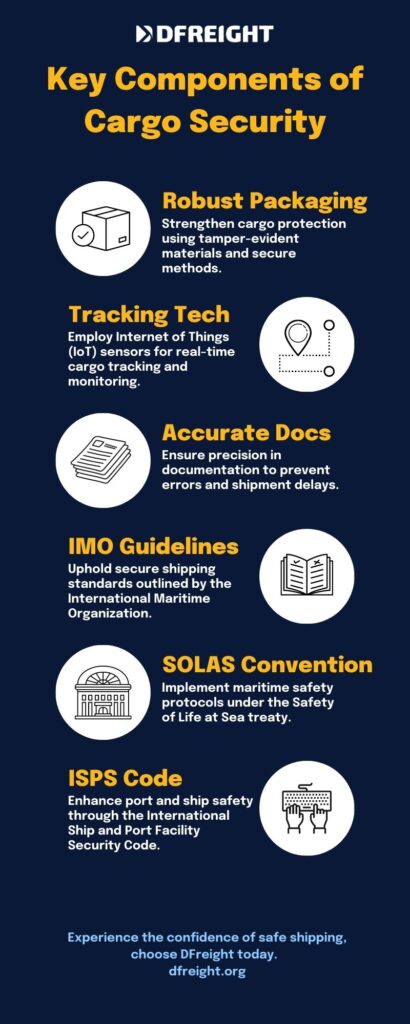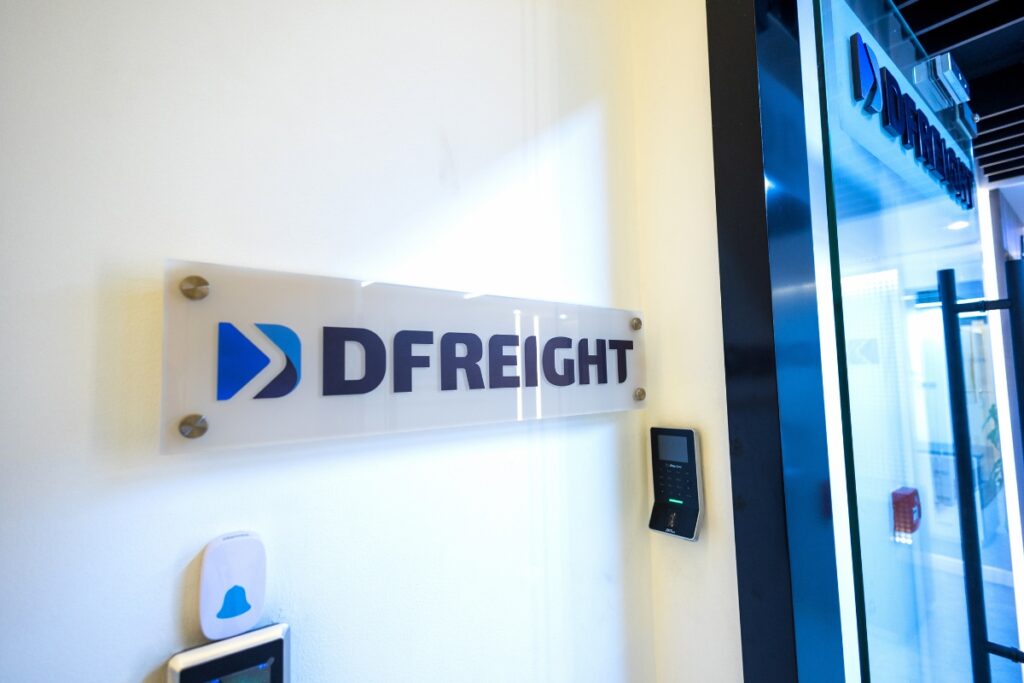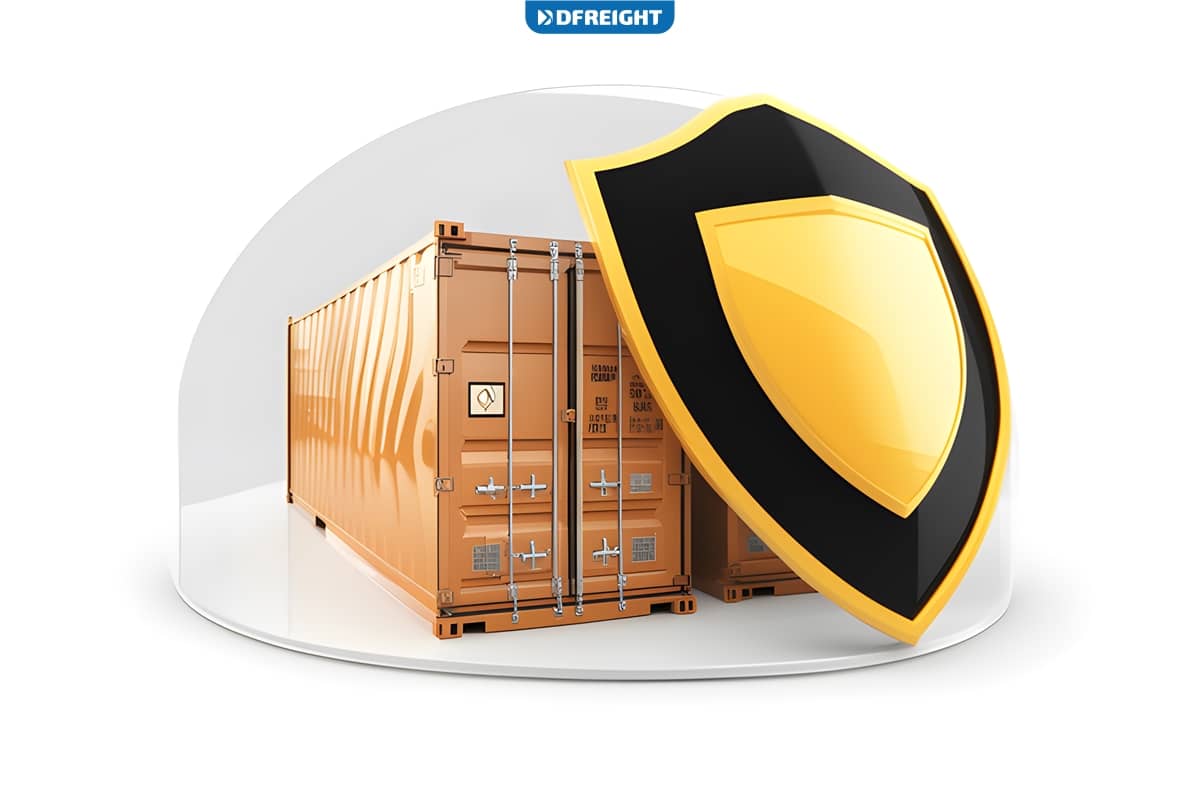In the vast tapestry of global trade, the movement of goods across borders and oceans fuels economies, builds bridges between cultures, and shapes how we interact with the world. As the backbone of international commerce, shipping is indispensable in connecting producers and consumers across continents. However, amidst this bustling exchange of goods, a pressing concern looms large: cargo security during its journey.
Unlock a new era of secure and reliable shipping with DFreight, your trusted digital freight forwarder. Our online platform and user-friendly mobile app give you real-time visibility and control over your shipments. Backed by extensive experience in shipping diverse cargo worldwide, DFreight ensures that your goods are handled with the utmost care and precision. Join us in shaping the future of international trade by embracing innovation, expertise, and a commitment to cargo security. Experience the confidence of safe shipping – choose DFreight today.
Welcome to our guide, “Is Your Cargo Safe? A Guide to Ensuring the Security of Shipments.” In this comprehensive exploration, we delve into the critical importance of cargo security in international shipping. We shed light on the potential risks and consequences arising when cargo security is compromised, emphasizing the far-reaching impact on economies, environments, and societies.
Table of Contents
Security of Shipments
Cargo security encompasses a spectrum of measures and practices to safeguard shipments against various threats. These threats go beyond the traditional notion of theft and extend to tampering, unauthorized access, and transporting hazardous or contraband materials. The objective is clear: to ensure that the integrity of cargo remains intact throughout its journey, preserving its value, reliability, and safety.
Types of Cargo Threats: Theft, Tampering, and Hazardous Materials
The challenges to cargo security are diverse, each presenting its own set of risks. Cargo theft, for instance, is a persistent concern, with criminals seeking opportunities to intercept shipments, pilfer valuable goods, and disappear before detection. On the other hand, tampering involves unauthorized alterations to cargo that can compromise its quality, safety, or contents. In hazardous material cases, mishandling can lead to catastrophic consequences, endangering lives, ecosystems, and the environment.
The Impact of Insecure Cargo on Trade and Economies
The repercussions of compromised cargo security are far-reaching, reverberating through supply chains, economies, and societies. When shipments are lost, stolen, or tampered with, businesses incur financial losses, supply chain disruptions occur, and consumer confidence wavers. Industries reliant on just-in-time production and delivery models can suffer significant setbacks, leading to widespread ripple effects across economies. Additionally, transporting hazardous materials without proper safeguards can lead to environmental disasters and pose severe risks to public safety.
Essential Components of Cargo Security
Within the intricate ballet of international shipping, cargo security is a pivotal act that requires precision, planning, and a meticulous approach. Protecting shipments from a spectrum of threats demands a cohesive strategy built upon a foundation of essential components.

Robust Packaging and Storage Techniques
The journey of cargo begins with its packaging. Robust packaging is the first defense against tampering, theft, and damage. Materials that deter unauthorized access and tampering, such as tamper-evident seals and secure locking mechanisms, are crucial in preventing intrusions into cargo. Beyond deterring malicious intent, proper packaging also shields goods from the rigors of transit, reducing the likelihood of damage caused by rough handling or adverse weather conditions. Efficient storage techniques within shipping containers ensure that cargo remains stable and protected throughout the journey.
Advanced Tracking and Monitoring Technologies
In the digital age, the ability to monitor and track shipments in real-time is a game-changer for cargo security. A combination of technologies, such as Global Positioning System (GPS), Radio Frequency Identification (RFID), and Internet of Things (IoT) sensors, provides unparalleled visibility into the whereabouts, conditions, and status of cargo. This real-time tracking enhances security by allowing rapid responses to anomalies and offers transparency to stakeholders at every stage of the supply chain. This heightened visibility contributes to an environment of accountability, deterring potential threats.
Importance of Documentation Accuracy
Accurate and comprehensive documentation serves as the backbone of secure shipments. Properly documented cargo ensures no discrepancies between the shipped goods and their descriptions on paper. This reduces the likelihood of misunderstandings, delays, and mishandling resulting from inaccurate information. Accurate documentation also facilitates smoother interactions with customs authorities, ensuring compliance with regulations and minimizing the risk of disruptions due to paperwork issues.
IMO’s Role in Ensuring Cargo Safety
At the forefront of international efforts to enhance maritime security stands the International Maritime Organization (IMO). A specialized agency of the United Nations, the IMO is entrusted with the responsibility of developing global standards for the safety, security, and environmental performance of international shipping. Since its establishment in 1948, the IMO has consistently addressed emerging security challenges, resulting in a robust collection of conventions, codes, and guidelines that set the gold standard for safe and secure shipping practices.
Harmonizing Global Standards for Secure Shipments
One of the most remarkable achievements of the IMO is its ability to harmonize regulations across diverse nations and regions. The SOLAS (Safety of Life at Sea) Convention, a cornerstone of maritime safety, includes provisions that directly impact cargo security, emphasizing the importance of accurate documentation, proper packaging, and adherence to international codes of practice. Similarly, the ISPS Code (International Ship and Port Facility Security Code) mandates security measures to prevent acts of terrorism and other security threats, further safeguarding the international shipping industry.
Mitigating Cargo Security Risks
In the intricate choreography of international shipping, the dance of cargo security is not left to chance. It’s a well-orchestrated performance that demands meticulous planning, collaboration, and a proactive approach to identifying and addressing risks.
Pre-Shipment Preparations and Risk Assessment
The journey towards secure cargo begins long before goods are loaded onto a ship. Pre-shipment preparations involve a careful evaluation of the entire supply chain, from origin to destination. This includes scrutinizing the routes, transportation modes, and potential vulnerability points. A comprehensive risk assessment allows shippers to identify high-risk areas and potential threats, enabling them to implement targeted security measures. Shippers can make informed decisions that minimize risk exposure by understanding the intricacies of their shipments’ journey.
Collaborative Efforts Among Stakeholders
In cargo security, collaboration is not just a strategy – it’s a necessity. The interconnected nature of the global supply chain demands active cooperation among all stakeholders. Governments, shipping companies, logistics providers, port authorities, and even customers must come together to exchange information, share intelligence, and coordinate efforts. A collective approach enhances situational awareness and enables timely responses to emerging threats. This collaborative synergy is particularly crucial in addressing complex challenges like piracy, where joint efforts can lead to apprehending criminals and recovering stolen cargo.
Best Practices for Onboard Security Measures
As cargo embarks on its oceanic journey, security measures must extend beyond the port. Ships become floating fortresses tasked with protecting their precious cargo. Best practices for onboard security encompass a range of measures, from securing access points to employing trained security personnel. Locking mechanisms, access control systems, and well-defined security protocols ensure that only authorized personnel interact with cargo. Regular drills and training sessions help crew members respond swiftly to security breaches, mitigating the impact of potential threats.
Innovations in Cargo Security
In the rapidly evolving landscape of international shipping, staying ahead of security threats demands more than traditional methods. Innovative technologies have emerged as game-changers in the quest to ensure the safety and integrity of cargo throughout its journey.
Integration of IoT and Sensor Technologies
The Internet of Things (IoT) has revolutionized how we interact with our surroundings, and its impact on cargo security is no exception. Smart sensors embedded in cargo containers enable real-time monitoring of conditions such as temperature, humidity, vibrations, and even unauthorized openings. These sensors transmit data to centralized platforms, allowing shippers and stakeholders to receive immediate alerts in case of anomalies. This level of transparency enhances security by enabling rapid responses to disruptions and tampering attempts.
Blockchain’s Role in Enhancing Transparency and Traceability
Blockchain technology, known for its decentralized and immutable nature, transforms cargo security by enhancing transparency and traceability. Each stage of a shipment’s journey can be recorded on a blockchain, creating an unalterable digital trail. This ensures that information about the cargo’s origin, handling, and transportation remains accurate and tamper-proof. This technology mitigates the risk of fraudulent activities and streamlines the verification of shipments, reducing delays and improving overall efficiency.
AI for Real-time Threat Detection
Artificial Intelligence (AI) brings a new dimension to cargo security through its ability to analyze massive amounts of data and detect patterns that human operators might miss. AI-powered systems can identify deviations from expected behavior, enabling real-time threat detection. For instance, AI algorithms can analyze shipping data to detect unusual route changes, unscheduled stops, or irregular cargo movements that might indicate potential security breaches. By automating threat detection, AI contributes to more proactive and efficient security measures.
DFreight’s Approach to Safe and Reliable Shipping
In international shipping, where security and reliability are paramount, the role of a freight forwarder is pivotal. DFreight stands out as a beacon of innovation, commitment, and experience in delivering safe and reliable shipping solutions among these industry players.
DFreight emerges as a trailblazer in international shipping, combining the agility of a digital freight forwarder with a rich legacy of global experience. With a distinguished record in transporting a wide range of commodities worldwide, DFreight’s approach embodies a seamless blend of technological innovation, industry expertise, and an unwavering commitment to cargo security.
As a digital freight forwarder, DFreight leverages cutting-edge platforms to optimize processes, enhance transparency, and deliver real-time client visibility. Its unparalleled global expertise covers various industries and trade routes, ensuring that cargo is handled with precision and care regardless of its nature.
Embracing state-of-the-art technologies like IoT sensors, blockchain, and AI-driven analytics, DFreight takes cargo security to unprecedented heights, actively monitoring shipments, detecting real-time threats, and maintaining data integrity. DFreight’s collaborative approach further amplifies this commitment to excellence, nurturing relationships with shipping lines, carriers, and authorities to orchestrate secure and reliable supply chains.
In the dynamic realm of international shipping, DFreight stands as a beacon of innovation, trustworthiness, and dedication to ensuring safe deliveries across the globe.

Navigating the Future of Cargo Security
As we set sail into the future of international shipping, the horizon of cargo security continues to evolve. The maritime landscape is being reshaped by emerging technologies, changing trade dynamics, and heightened security concerns. Amidst these currents, the journey toward secure shipments is marked by anticipation and adaptation. By embracing innovative solutions, enhancing collaboration among stakeholders, and continually refining security strategies, the industry is poised to create a safer, more resilient global trade ecosystem. As we navigate these uncharted waters, the commitment to cargo security remains a compass guiding the way forward, ensuring that goods traverse the seas confidently and reliably in an ever-changing world.
Conclusion
In the intricate tapestry of international shipping, the thread of cargo security weaves through every aspect of the journey. From the moment goods are packaged to their arrival at their destination, safeguarding cargo integrity is a collective endeavor that demands vigilance, innovation, and collaboration. As we reflect on the diverse components, regulations, innovations, and industry leaders shaping the landscape of cargo security, it’s evident that the commitment to safe and reliable shipping solutions is stronger than ever. In this dynamic and interconnected world, where the movement of goods transcends borders and boundaries, the principles of cargo security stand as a beacon guiding the way toward a safer and more resilient future for global trade.
How can I ensure the safety of my cargo during transit?
Employ robust packaging, utilize advanced tracking technologies, and collaborate with trusted partners to ensure your cargo’s security from origin to destination.
What are the potential risks to cargo security?
Risks include theft, tampering, damage, and mishandling, as well as the transport of hazardous materials that can pose threats to both people and the environment.
How do digital technologies contribute to cargo security?
Technologies like IoT sensors, blockchain, and AI-driven analytics provide real-time monitoring, data integrity, and threat detection, enhancing cargo security measures.
Why choose an experienced freight forwarder for secure shipping?
Experienced freight forwarders like DFreight bring a wealth of industry knowledge, enabling them to navigate complex security challenges and ensure the safe transport of various commodities worldwide.
How does regulatory compliance impact cargo security?
Compliance with international maritime regulations, such as those set by the IMO, ensures adherence to security standards and contributes to the overall safety of cargo.














